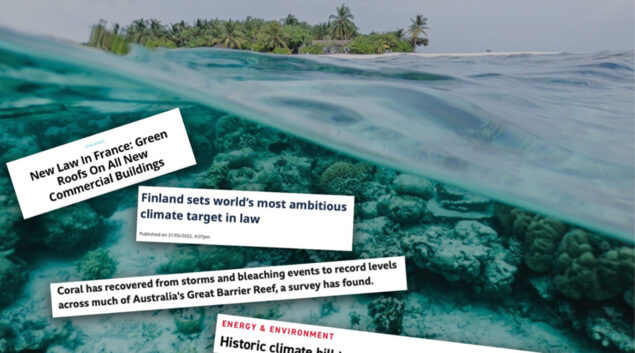
Hello! It’s August and most of us are back from our well-deserved vacations, so we think it’s a fitting moment to recap what has gone down in the climate world in the past two months.
Now you’re likely getting flashbacks to horrifying headlines such as “railway tracks melting”, “natural gas is labelled green”, and “Biden’s climate plan destroyed”, – to name only a few. And yes, this summer has undoubtedly been plagued by various events that have significantly reduced the climate agenda. In fact, some even say that it’s been a few of the worst months on record in the fight against climate change.
But that’s not what we’re here to discuss today – we’re here to tell you that it hasn’t been ALL bad. There’ve been a handful of positive happenings during the summer as well, some of which we believe have been overshadowed by all the not-so-great news.
Here are a few things that managed to put a smile back on our faces while the world’s (quite literally) been on fire:
Finland has set the world’s boldest climate target into law
At the beginning of the summer, it was announced that our neighbours over in Finland have set out to reach net zero by 2035 and net negative (meaning that they’d absorb more C02 than they emit) five years later in 2040. This is arguably the most ambitious climate target to date that has been passed into law. Emma Kari, Finland’s environment minister, sees the target as “ambitious but achievable” and adds that it has cross-party support in Finland. An important aspect is that the target will be met without reliance on carbon offsets (!). Instead, the plan is to ramp up wind power and energy efficiency in buildings and make them less reliant on fossil fuels, particularly heating. However, a key issue that might threaten Finland’s ability to reach its target is its emissions stemming from deforestation, which have been rising over the past ten years. To resolve this, the Ministry of Agriculture and Forestry is currently working on its first-ever climate plan.
Germany’s 9-euro ticket incentivised car users to switch to public transportation
To cushion rising fuel and living costs, on June 1st Germany introduced a heavily discounted travel pass allowing all passengers – both locals and tourists – cheap access to public transportation during the entire summer season. The pass can be used around the entire country during June, July, and August for the very affordable price of nine euros (so if you’re currently in Germany or will be visiting soon, make sure to get your hands on it). While in some regions this did cause problems with overcrowded trains, delays, and lack of service staff, the overall verdict is that the travel pass has been an all-around success, enticing many that normally travel solely by car to hop on the train or bus instead.
A new “historic” climate bill will bring the U.S. closer to reaching its climate goals
The climate tide has yet again turned in the U.S. (and this time in a positive direction), as the Senate passed the Inflation Reduction act on Sunday – a bill that will devote USD 369 billion to clean energy sources, allowing the U.S. to transition away from fossil fuels. Although the bill is by no means perfect and USD 555 billion short of what Democrats originally called for, it is the largest federal clean energy investment in U.S. history. The Guardian writes that the new bill is “a far cry from Biden’s original ambition, but it nonetheless represents victory for the president”.
According to a fresh analysis conducted at Princeton University, if signed into law, the new bill would allow the U.S. to slash its emissions by 42% by 2030, compared to 2005 levels. This would equal around 3.8 billion metric tons of CO2e, getting the country a significant step closer to Biden’s goal of halving emissions by 2030.
France first to mandate green roofs for all new commercial buildings on a nationwide scale
Recently, the French Parliament approved a new law that will require all new commercial construction to have at least parts of their roofs covered with solar panels or plants. Although the law is less extreme than the original proposal by French environmental activists who demanded complete coverage of the roofs, it is also a win in many ways. Not only do green roofs serve multiple purposes as they can act e.g. as rainwater catchment systems, additional insulation (thereby reducing energy costs), and additional spaces on which to grow and produce food – they also last two or three times longer than traditional roofs, and reduce pressure on the national power grid during extreme weather conditions (given that solar panels are present on the roofs).
Similar initiatives have been approved elsewhere, for instance in Toronto, where it already in 2009 was decided that roofs of residential and industrial buildings should be covered in green roofs. However, France is the first country to approve such an initiative on a nationwide scale.
Coral comeback at Australia’s Great Barrier reef, showing most coral in decades
How are the corals in Australia doing, you might wonder? The last time we heard about them was in March this year, as the reefs were struck by another heart-breaking mass bleaching event caused by warm sea temperatures. The good news is that a new survey by the Great Barrier Reef Marine Park Authority indicates promising signs of recovery, reporting that the reef’s northern and central parts now have the highest amount of coral cover since the monitoring first began in 1986. However, new coral is particularly vulnerable to the effects of climate change, so all the progress that’s been made recently could quickly be erased.
That’s a wrap for now. Surely, there has been plenty more good news that we didn’t manage to cover in this post, and if you can think of any, we’d love for you to share them with us under our LinkedIn post.



